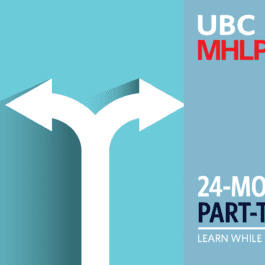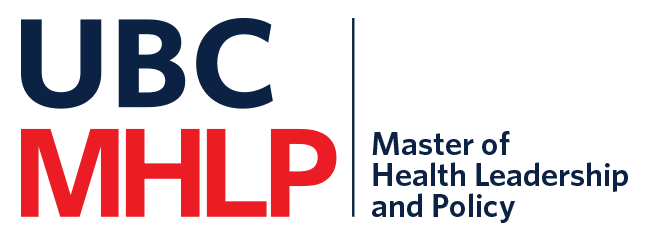
Part-time studies offer full-time rewards

The part-time option for the Master of Health Leadership and Policy in Clinical Education and Seniors Care is a rewarding pathway for students who want to maintain their work commitments while deepening their knowledge and skills in health care, business and leadership.
Students who choose the part-time option complete their required courses over a 24-month period. Classes are held on Mondays and Wednesdays during the day, making it feasible to schedule work and other commitments around class time.
Sabrina Gill has just finished the first 12 months of the MHLP in Clinical Education. In the first year of her program, she completed all the required business classes and two health-care leadership classes. In year two of her program, she will complete the remaining four required health-care courses along with a 70-hour graduate practicum in nursing. (Students in Seniors Care follow the same schedule in year one, and will complete five health-care courses in year two; they do not do a practicum.)
As she shared in a profile published in April 2021, Sabrina chose the part-time option as she felt it would be a more meaningful experience, enabling her to immediately apply the knowledge she was learning in class to her workplace. She also didn’t want to give up her connections to her colleagues and patients in her work as a nurse clinician on an interdisciplinary team at BC Children’s Hospital in Adolescent Health and Medicine.
She’s continued to work at 0.8 FTE while going to school and raising two children. “It’s a lot of work,” she says, “but the program has re-energized me. The courses also encourage considerable self-reflection, and I’ve found that very helpful as I think about situations at work and how they might be managed more effectively.”
Sabrina offers several examples of the valuable connections she’s built between her classroom experience and her career. “In a course on leadership and sustainability, I did an assignment on eco-anxiety that drew upon the concerns I see in the adolescents I work with,” she says.
Similarly, after writing a paper on equity, diversity and inclusion initiatives for one of her courses, she repurposed the content to successfully apply for a small grant to facilitate mentorship opportunities for BIPOC health-care workers.
Her advice for students considering the part-time option while working or carrying other significant responsibilities is to be disciplined when it comes to time management.
“Give yourself the time you need to really engage with your learning and do your assignments. Keep in mind that with two or three classes per semester, you could have a paper or assignment due every week.”
Chelsea Ousey, the Student Recruitment Specialist for the MEL and MHLP degrees, advises students who plan to work while going to school to keep their work commitments minimal at the start of the program – perhaps a 0.5FTE equivalent – and then adjust as the year progresses.
“In the early weeks of the program, you will likely be relearning what it means to be a learner,” she says. “As you figure that out and discover what works for you, you may be able to increase your commitments outside of school. Whatever you do, you should plan for a busy two years.”
A typical rule of thumb is that each one hour of classroom time requires about three hours of work outside of class. However, as Chelsea notes, some times of the semester are going to be particularly busy, requiring considerably more time to complete projects.
One of those times is a three-week period in August when students must complete APPP 504: Business Acumen for Technical Leaders, popularly known by students and instructors as summer camp. In addition to attending full-day in-person classes, there are extensive time commitments after class on evenings and weekends to complete group work, assignments and presentations.
Sabrina planned ahead for this period, taking three weeks off work and arranging for her mother to look after her children so she could complete the summer camp and immerse herself in learning new knowledge about operations, marketing, business development and accounting.
Deciding whether you want to complete the MHLP in one year or two is entirely personal and depends on your other commitments. Sabrina is a true fan of the part-time option for allowing her to continue working in a job she loves and applying her newly expanded skill set and ideas to her work on a daily basis.
“With the part-time option, your skills are transferable right away – and whether you are already in a leadership role or not, you can see the difference that makes in terms of impact.”
Read about working while doing a master’s degree and sign up for an upcoming with the Student Recruitment Team to learn more about whether part-time studies could be right for you. </em>
Clinical Education
Develop the educational strategies and leadership skills to create caring, collaborative clinical environments.
Read MoreSeniors Care
Move your career forward as a health-care specialist dedicated to improving patient outcomes and fostering the well-being of seniors.
Read MoreApplication Deadlines
The online application portal for the January 2025 has closed.
Get ready to apply!
Admissions for the 2026 intake will open on January 1, 2025.
How to Apply



